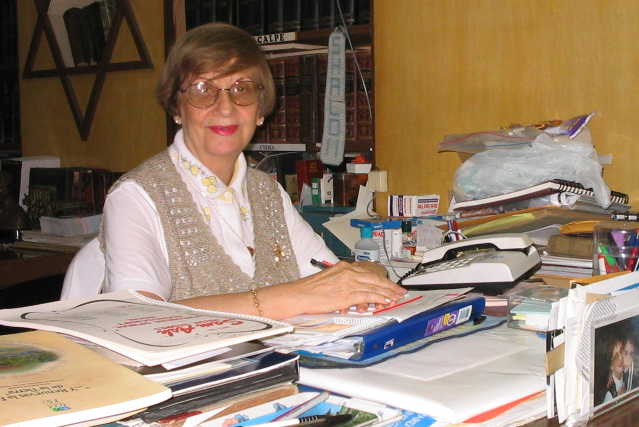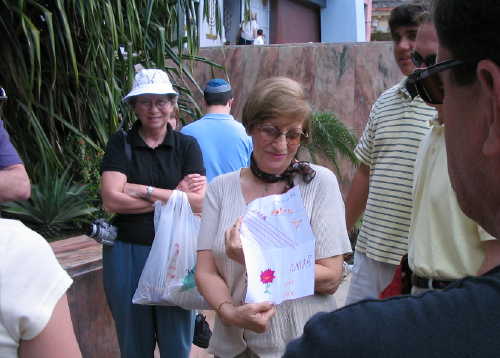
|
Adela Dworin, Vice President of Casa de la Comunidad Hebrea de Cuba If Dr. Jose Miller is the pillar off strength providing support for the Cuban Jewish community, Adela Dworin is the dynamo of energy that keeps everything running. For several days I tried to get time with Adela for a sit-down interview, but each time we made arrangements something came up to divert her. Synagogue groups from all of the world drop by and want to be taken on a tour. Individuals from the world's Jewish communities wander in the door, curious and inquisitive about what they have found. Scholars, children, food providers, travel arrangers, and more all gravitate to Adela to have their problems solved. She takes them all in with patience and good humor. She also takes time to take care of the needs of members of the community. She is their confidante, the source of medicines when the pharmacy is closed, and the person with the key to the closet full of clothing and other supplies. In 1924 Adela's
father left Pinsk, now in Belarus, intending to go to the United States.
Like many Jews of that time, his route was through the Caribbean (see
Robert Levine's "Tropical Diaspora"),
and he ended up in Cuba. He could not afford a visa to the States, and
became a peddler. As Adela tells the story, in 1930 a young woman who
has destined to be Adela's mother left Pinsk en route to Cuba. She carried
letters to a young man (who would eventually be Adela's father) from
her town living in Cuba. They met at the Pinsk Union in Havana, the
letters were delivered, they fell in love, and got married. Adela was raised in an Orthodox home, and grew up speaking Yiddish. "My grandmother never learned Spanish," she says, "so I had to communicate with her in Yiddish." She attended the Jewish elementary school in Havana. Her father opened a small store, and by 1959 he had a big factory. Then, as Adela says, "He lost everything." In spite of the losses the family stayed in Cuba, and her father got a job with the government. Although the government at that time was officially atheistic, Adela's father insisted that his family do volunteer work in the Jewish Center, which had been built in 1953. Adela says that during those years, "Many leaders did not come to the synagogue." Persons thought to be religious could not find good employment, so choices had to be made. Adela worked in the Jewish Center library, and says that it was mostly used by non-Jews and the elderly. In her 30 years of work at the Jewish Center, Adela has seen many changes. In 1981, after 90 percent of Cuba's Jewish population moved to the United States, Argentina, and other countries, the government said that the mortgage on the Jewish Center had to be paid. The ten percent of the remaining population could not afford this, so a part of the building was sold to the Ministry of Culture, and is now a theater and a cafeteria. Adela also remembers the 25th anniversary of the founding of Israel. "We had a big cake with a flag of Israel on it," she says. "We also took this occasion to remember those lost in the Holocaust. But we had to do this in secret, and only a few of us participated." In 1991 Cuba's government policy changed from being an "atheist" state to a "secular" state, and people started returning to the synagogues and churches. "If you had asked me twelve years ago if Judaism would be revived in Cuba, I would probably have told you no," says Adela. "I thought the community would just disappear. But now we have a minyan on Friday night, and 50 or 60 people attending the Sunday schools." This attendance is helped by a liberal policy on who is Jewish. "If they want to be active, they are accepted," says Adela, a statement which would cause some consternation in more Orthodox Jewish circles. But Cuban Judaism exhibits an ancient Jewish flexibility, and the labels of othodox, conservative, and reform are not rigidly applied. Adela keeps a kosher home, which is difficult in a country which lives to a great extent on ham and cheese sandwiches. "My grandmother taught me the kosher laws," says Adela, "and it is difficult but not impossible." Live chickens are taken to the kosher butcher, and Adela faithfully gets her ration of 2.2 pounds of beef a month from the same place. "In restaurants we eat fish and vegetables," she says.
In recent years there have been substantial changes in the types of visitors coming to the Patronato. "We thought there were no Jewish Americans," says Adela. "All of our Jewish visitors came from other places. But now, with the JDC, B'nai B'rith, the Cuba-America Jewish Mission and others, we have a lot of U.S. visitors." Adela is proud to give these visitors a tour, taking in the library, the synagogue, the pharmacy, the computer center, and the general surroundings of the Patronato. Adela remains in charge of the library, who now has over ten thousand books, two thousand of these in Yiddish. Many of the books are over 50 years old. "Young people prefer computers," Adela says, "so we are losing our library readers to the upstairs computer center." But then Adela looks up and smiles. "But the important thing is that they want to come to the synagogue," she says. "They love to stay late, and socialize, and talk. Our community is coming back to life." Article by Richard
Smith |

